Business
King Charles III banknotes enter circulation

Kevin Peachey,Cost of living correspondent
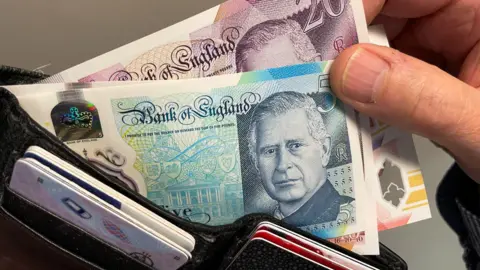 BBC
BBCNew banknotes featuring the portrait of King Charles III have now entered circulation, but it may be some time before they are commonly seen in wallets and purses.
The new Bank of England notes will gradually replace those which are damaged, or will be issued when demand increases.
The King is only the second monarch to appear on these notes, with Queen Elizabeth II first featuring in 1960.
Shoppers can still use current circulating £5, £10, £20 and £50 notes carrying the portrait of the late Queen.
The reverse side of current polymer Bank of England banknotes, which in ascending order feature Sir Winston Churchill, Jane Austen, JMW Turner and Alan Turing, are unchanged. Notes issued in Scotland and Northern Ireland feature other images, and not the monarch.

The first new banknotes were printed last year, with the long lead-in time allowing automated machines that accept cash to be updated to recognise the new designs. The King’s portrait is based on a picture taken in 2013.
In April last year, the BBC was given exclusive access to the highly-secure site where the notes are being produced.
A year on, the King was presented with a full set with the lowest serial numbers, following the tradition of the monarch receiving the first issues of new banknotes.
Collectors seek banknotes which come as close to the 00001 serial number as possible.
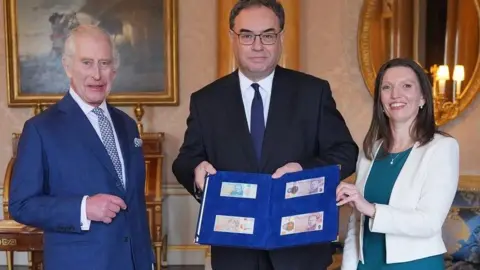 PA Media
PA MediaWhile the King is appearing on banknotes, cash may be disappearing from our lives.
“This is a historic moment, as it’s the first time we’ve changed the sovereign on our notes,” said Bank of England governor, Andrew Bailey.
“We know that cash is important for many people, and we are committed to providing banknotes for as long as the public demand them.”
But a survey for Link, the UK’s cash access and ATM network, found that nearly half (48%) of those asked said they expected a cashless society during their lifetime.
However, the same proportion said this would be problematic, and 71% of those surveyed said they still had some level of everyday reliance on cash.
Yet figures from consumer association Which? found that 6,000 bank branches had closed in the last nine years, leaving many places with none at all and limited access to cash.
Fifty of them now have banking hubs – shared premises, often run by the Post Office – where customers of any bank can withdraw and deposit cash, and where community workers from different banks visit once a week.
One of the more unusual is in the harbour town of Looe in Cornwall, a county with rich connections to King Charles.

The hub is found behind a cafe and heritage centre and underneath a top restaurant, where the entrance to a climbing wall used to be.
“People can come to take money out, put money in, they can deposit cheques, we give change for local businesses,” said Debbie Young, manager at the hub.
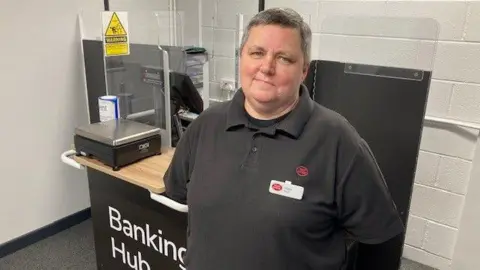
“People come to pay their bills and top up their gas and electric.”
With the last bank having closed 18 months ago, the hub is a lifeline, according to Ange Harrison, who manages the coffee shop in front of the hub.
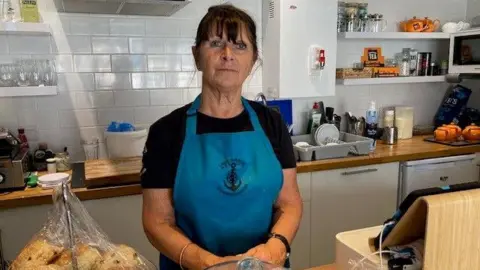
“Obviously you can bank your cash right away, you don’t have to worry about having cash on the premises,” said Mrs Harrison, a former fishmonger who has lived in Looe all her life.
“For all the businesses in the town, they need to use it. You know that old saying – if you don’t use it, you are going to lose it.”
That was true too of cash, and she said people were curious to see the new banknotes featuring the King.
It will be a slow change for our change – but there are still a longer-term questions over the future of notes and coins.
Where the King’s image now features
- Coins December 2022: Millions of 50p coins with the King’s image entered circulation. Other new coin designs, such as a bee on the pound coin, were introduced towards the end of 2023.
- Stamps March 2023: The first King Charles stamps were issued by Royal Mail as part of a special set. The following month, the new regular first and second-class stamps were issued, showing the King without his crown.
- Passports July 2023: British passports in the name of “His Majesty” rather than “Her Majesty” were issued.
- Official portrait January 2024: Public buildings, such as town halls and courts, were offered an official photo of the monarch, taken at Windsor Castle.
- Tudor crown February 2024: King Charles’s preferred design of crown was introduced in places such as the gov.uk website and official buildings.
- Banknotes June 2024: The Bank of England issues £5, £10, £20 and £50 banknotes with the King’s portrait, based on a picture taken in 2013
- Postboxes: Postboxes are only changed when they are damaged or scheduled for extensive repair, meaning there are still examples from Queen Victoria’s reign. This looks likely to be one of public symbols slower to change.
Business
Democratic donors say they won’t finance party until he drops out

U.S. President Joe Biden walks to deliver remarks after the U.S. Supreme Court ruled on former U.S. President and Republican presidential candidate Donald Trump’s bid for immunity from federal prosecution for 2020 election subversion, at the White House in Washington, U.S., July 1, 2024.
Elizabeth Frantz | Reuters
President Joe Biden is facing an uprising from some his own party’s wealthy donors, including an heiress to the Disney family fortune, who say they will no longer fund the Democratic Party until Biden steps down following his disastrous debate performance.
Abigail Disney, the granddaughter to Roy O. Disney, who cofounded The Walt Disney Company, told CNBC on Thursday that she plans to withhold donations to the party she has funded for years until Biden drops out. The president has said he has no plans to withdraw from the race, despite calls for him to do so.
“I intend to stop any contributions to the party unless and until they replace Biden at the top of the ticket. This is realism, not disrespect. Biden is a good man and has served his country admirably, but the stakes are far too high,” Abigail Disney said in a lengthy statement to CNBC. “If Biden does not step down the Democrats will lose. Of that I am absolutely certain. The consequences for the loss will be genuinely dire.”
The Democratic Party at large has been in a state of panic since Biden struggled to perform in the debate against former President Donald Trump last week. Rep. Lloyd Doggett, D-Texas, called on Biden to drop out of the race, suggesting the debate performance proved to voters that the president is incapable of taking on Trump and unable to overcome his distance in the polls.
A New York Times/Sienna College poll taken after the debate showed Biden behind Trump by 6 percentage points among likely voters.
Representatives for the Biden campaign did not return requests for comment.
Abigail Disney has been a longtime supporter of Democrats. She gave $50,000 to the Jane Fonda Climate political action committee in April, according to a Federal Election Commission filing. The PAC has given $35,000 to Democrats running for congressional seats, according to data from OpenSecrets.
Disney gave $150,000 in 2014 to Planned Parenthood Votes, a PAC affiliated with the health care nonprofit, according to OpenSecrets. That PAC this election cycle has spent over $400,000 supporting Democrats, including $26,000 for Biden.
Disney pointed to Vice President Kamala Harris as a solid alternative to Biden, arguing she’d be able to defeat Trump.
“We have an excellent Vice President. If Democrats would tolerate any of her perceived shortcomings even one tenth as much as they have tolerated Biden’s (and let’s not kid ourselves about where race and gender figure in that inequity) and if Democrats can find a way to stop quibbling and rally around her, we can win this election by a lot,” Disney said.
And she’s not the only one pausing gifts until Biden steps down. Gideon Stein, the president of the Moriah Fund, said he’s decided to pause planned donations of $3.5 million, earmarked for nonprofits and political organizations aligned with the presidential race.
“Joe Biden has been a very effective president, but unless he steps aside my family and I are pausing on more than $3 million in planned donations to nonprofits and political organizations aligned with the presidential race, with the exception of some down ballot work,” Stein said. “Virtually every major donor I’ve talked to believes that we need a new candidate in order to defeat Donald Trump.”
Karla Jurvetson, a philanthropist and major Democratic donor, hinted as recently as Tuesday in a private donor call that she agrees with the sentiment on pausing donations until Biden steps down and could end up making such move, according to a person familiar with her remarks. The person was granted anonymity in order to speak freely about a private conversation.
A spokesman for Jurvetson did not return repeated requests for comment.
Jurvetson is among the top 50 donors this cycle across the country, donating over $5 million to Democrats, according to OpenSecrets. She’s given over $200,000 to the Biden Victory Fund this cycle, according to FEC records.
Jurvetson gave over $30 million to Democrats in 2020, according to the data.
Business
Civics are becoming a 21st-century business skill


The Fourth of July is a day typically filled with food, festivities, and fireworks in the U.S., as our nation celebrates the passage of the Declaration of Independence in 1776. But this day commemorates something else, too.
Our celebration of Independence Day is an opportunity to reflect on our country—the progress we have made and the work we must still do to strengthen our democracy and communities as we look toward the future.
Like a successful business, democracy only works when all of its components function well. The very skills that formed this great experiment are the same skills that spark the inspiration and innovation necessary for breakthrough ideas and continued economic growth. In other words, civics is a 21st-century business skill.
Critical thinking, problem-solving, negotiation, curiosity, adaptability, shared risk-taking, and other so-called “soft skills” are increasingly called “durable skills” because there’s nothing soft about them. In fact, a recent LinkedIn survey found that nine out of 10 global executives say they are more important than ever in the workplace.
Collaboration and shared risk-taking
in government, facilitating and making decisions requires people to work together. Whether it’s running a polling station on Election Day or serving on a municipal committee, the path to getting things done includes working with others who may hold opinions and ideas that are quite different from your own.
While our neighborhoods, houses of worship, schools, and other places where we gather with others may be homogenous, in the workplace, we are likely to encounter people who are different from us.
When team members with varied opinions and perspectives can work respectfully and effectively together, organizations win. Companies and teams adept in durable skills can be expected to deliver greater employee morale, improved product service or quality, and increased innovation, to name a few.
Defusing conflict and solving problems
Failure to understand how our government works is preventing people from finding common ground on basic issues. This lack of knowledge foments division, frustration, and ultimately, incivility and an inability to communicate effectively with others, especially those who see the world differently.
Most Americans believe the nation’s tone is uncivil (58%). However, when people have a shared understanding of organizations and processes, they can listen to others’ arguments and make strong rationales of their own. In doing so, they can better use reason to compromise and manage conflict.
Honing negotiation skills
Think about the way legislation is often crafted: Someone has an idea for change. Others may disagree. In an ideal world, they discuss their differences, find common ground, and draft legislation made stronger by a range of viewpoints.
Increasingly, managers are concerned about their team members’ unwillingness to compromise and inability to sit together and come to an agreement. By many accounts, our founding fathers held wildly differing opinions and argued fiercely. However, they were able to reach compromises that became our nation’s foundation.
Training critical thinking
While sometimes met with chagrin, jury duty is one of the most important ways citizens participate in our system of governance.
Being a good juror requires weighing evidence, questioning our own preconceptions, and asking good questions. These are the same critical thinking skills necessary in making key organizational decisions.
Building leaders
Understanding and participating in how our government is run teaches us how to operate in complex systems, navigate change, and use good judgment and reason to reach a goal. In short, civic engagement builds leaders who can apply those skills in myriad ways, including in the workplace.
Americans are eager for employers to help build bridges, create healthier discourse, and strengthen cooperation in the communities they serve. Eighty-two percent of Americans believe that businesses can play a role in bringing our country together, and nearly 75% of voters agree that businesses have a responsibility to protect our economic system and national environment.
Businesses can take small yet meaningful steps to boost civic engagement. For example, employers may offer their employees time off to serve as nonpartisan poll workers during local, state, and national elections, addressing a critical shortage across America. Or they can support employees selected for jury service by providing resources to help them prepare for their duties. They can also provide educational experiences that reintroduce employees to civics basics, empowering them to learn more about how our government works and how they can meaningfully participate. The U.S. Chamber of Commerce Foundation runs one of several such initiatives that help employers enhance civic skills within their teams.
As we prepare to celebrate Independence Day, now is the time for the business community to commit to elevating civics education and skills in the workplace.
More must-read commentary published by Fortune:
The opinions expressed in Fortune.com commentary pieces are solely the views of their authors and do not necessarily reflect the opinions and beliefs of Fortune.
Business
Trump falsely claims to have driven Biden from race in video, Daily Beast reports By Reuters

(This story contains offensive language in paragraph 3)
By Jeff Mason
WASHINGTON (Reuters) – Republican Donald Trump falsely claimed to have driven Democratic President Joe Biden out of the White House race and disparaged Vice President Kamala Harris in a video published by the Daily Beast, which drew a sharp rebuke from the Biden campaign.
Former President Trump was filmed at one of his golf courses seeking plaudits for his debate against Biden, whose stumbling performance a week ago sparked calls from his fellow Democrats for him to step aside.
“He’s quitting the race … I got him out,” Trump says in the footage, published late Wednesday. He then disparages Harris, who sources say would likely take over from Biden as the Democratic presidential candidate if he were to pull out, saying, “She’s so bad, she’s so pathetic, she’s just so fucking bad.”
Biden, 81, told his campaign on Wednesday that he was still running. His campaign fired back at Trump, 78, in a statement.
“No, Donald. What is bad is taking away women’s rights; What is bad is losing an election and encouraging a violent mob to attack the Capitol; What is bad is assaulting women; What is bad is not paying your taxes,” spokesperson Sarafina Chitika said.
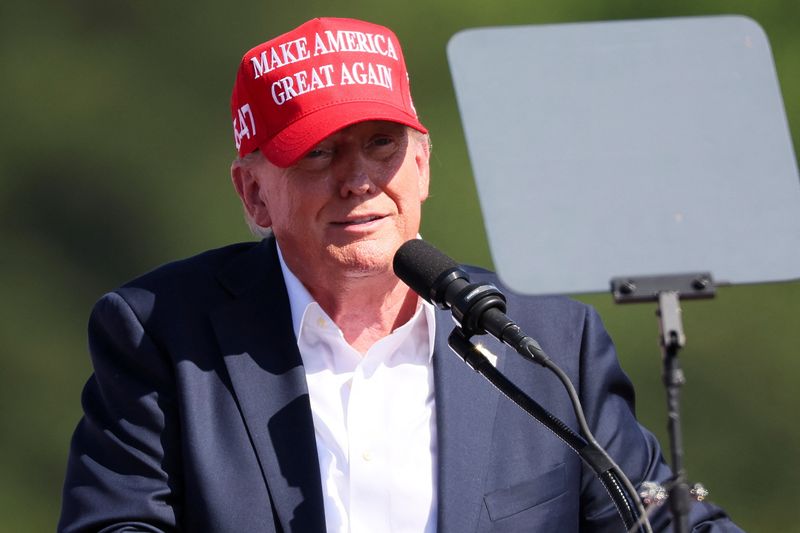
Trump’s campaign stood by his words, with co-campaign manager Chris LaCivita responding on X: “Nothing in this video is incorrect.”
Reuters verified the location of the video as Trump National Golf Club in Bedminster, New Jersey. The golf cart Trump is seen driving features the number one and a presidential seal; he has been seen driving the same cart before in file video from the course.
-

 African History5 years ago
African History5 years agoA Closer Look: Afro-Mexicans 🇲🇽
-

 African History5 months ago
African History5 months agoBlack History Facts I had to Learn on My Own pt.6 📜
-

 African History5 years ago
African History5 years agoA Closer Look: Afro-Mexicans 🇲🇽
-

 African History1 year ago
African History1 year agoMajor African Tribes taken away during the Atlantic Slave Trade🌍 #slavetrade #africanamericanhistory
-

 African History1 year ago
African History1 year agoCameroon 🇨🇲 World Cup History (1962-2022) #football #realmadrid #shorts
-

 African History5 months ago
African History5 months agoBlack History Inventors: Mary Kenner 🩸
-

 African History1 year ago
African History1 year agoPROOF AFRICAN AMERICANS AIN'T FROM AFRICA DOCUMENTED EVIDENCE
-

 African History1 year ago
African History1 year agoNo African pre-Columbus DNA? 🤯🤯 #history #mesoamerica #mexico #african

























